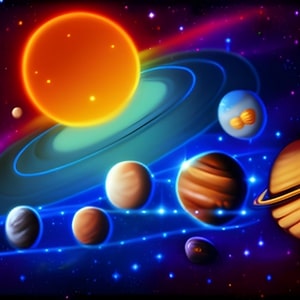9 Planets and their Characteristics in Astrology – Astrology has been used for centuries as a tool for gaining insight into human personality, relationships, and the events of our lives. One of the foundational elements of astrology is the study of the planets and their influence on our lives. In total, there are nine planets that are considered in astrological practice, each with its own unique characteristics and influences. In this article, we’ll take a closer look at each of the nine planets and explore their key traits and how they impact our lives. Whether you’re a seasoned astrologer or just starting out, this article will provide you with valuable insights into the fascinating world of planetary influence. So, let’s dive in and explore the nine planets and their characteristics in astrology.

Sun: Central Planet among 9 Planets in Astrology
While talking about 9 planets and their characteristics in astrology, the sun represents the core essence of a person’s identity and the center of their being. It is associated with the individual’s personality, ego, and self-expression.
The sun is the ruler of the zodiac sign Leo, and it is considered to be one of the most powerful planets in astrology. Its position in the natal chart indicates the person’s general nature, as well as their strengths, weaknesses, and potential for growth.
The sun’s energy is often associated with creativity, self-confidence, leadership, and vitality. It is also said to represent the father figure in a person’s life, as well as authority figures and leaders in general.
In terms of transits and progressions, the sun’s movement through the zodiac can have a significant impact on a person’s life. For example, when the sun is in your sign (i.e. your birthday month), it is believed to be a time of increased energy, self-awareness, and potential for personal growth.
Overall, the sun plays a crucial role in astrology and is considered one of the most important planets in interpreting a person’s natal chart.
Moon: Nurturing Planet in Astrology
In astrology, the moon represents our emotional nature and inner world. It is associated with our instincts, habits, and subconscious mind. The moon is also linked to our nurturing side and how we seek comfort and security in our lives.
In a natal chart, the placement of the moon can provide insight into a person’s emotional needs, how they express themselves emotionally, and what they need to feel safe and secure. The moon’s sign and aspects to other planets can also influence a person’s mood and how they respond to different situations.
Additionally, the moon is an important factor in timing events in astrology. The moon’s cycles are used to determine the best time for planting and harvesting crops, as well as for performing rituals and casting spells in certain traditions.
Overall, the moon plays a significant role in astrology, representing our inner world and emotional landscape, as well as serving as a timing tool for various astrological practices.
Mars: Assertive Planet in Astrology
In astrology, Mars is often referred to as the planet of action and energy. It represents our drive, ambition, and our ability to assert ourselves in the world. Mars is associated with passion, courage, and our capacity for competition and combat.
In a natal chart, the placement of Mars can provide insight into a person’s assertiveness and their approach to conflict. The sign and aspects of Mars can influence a person’s style of taking action and pursuing their goals. A well-placed Mars can indicate a strong sense of drive and confidence, while a challenging Mars can manifest as impulsiveness, anger, or a tendency towards conflict.
Mars is also associated with physical energy and sexuality, and its placement in a chart can reveal a person’s sexual preferences and energy levels.
In traditional astrology, Mars was also considered to be the ruler of the sign Aries and co-ruler of Scorpio, which further emphasizes its role as a powerful force of action and desire.
Overall, Mars plays an important role in astrology, representing our drive, ambition, and assertiveness, as well as our physical energy and sexuality. Its placement in a chart can reveal a great deal about a person’s approach to life and their ability to achieve their goals.
Mercury: Communicative Planet among 9 Planets in Astrology
While talking about 9 planets and their characteristics in astrology, Mercury is associated with communication, intelligence, and information processing. It represents our ability to think, reason, and communicate with others. Mercury is also linked to adaptability, curiosity, and learning.
In a natal chart, the placement of Mercury can provide insight into a person’s communication style, their learning abilities, and their intellectual strengths. The sign and aspects of Mercury can influence a person’s way of thinking and how they process information. A well-placed Mercury can indicate a sharp mind and excellent communication skills, while a challenging Mercury can manifest as difficulties in learning or communicating effectively.
Mercury is also associated with technology, transportation, and commerce, and its placement in a chart can reveal a person’s strengths or challenges in these areas.
In traditional astrology, Mercury was considered to be the ruler of the signs Gemini and Virgo, which further emphasizes its role as a powerful force in communication and learning.
Overall, Mercury plays an important role in astrology, representing our ability to communicate and process information, as well as our adaptability and curiosity. Its placement in a chart can reveal a great deal about a person’s intellectual abilities and communication skills.
Jupiter: Lucky Planet in Astrology
In astrology, Jupiter is a planet that is considered to have a significant influence on a person’s life and personality. It is often referred to as the planet of expansion, growth, abundance, and luck.
Jupiter is associated with qualities such as wisdom, optimism, spirituality, and higher education. It is also linked to areas such as travel, philosophy, religion, and law.
Jupiter is considered a beneficial planet in astrology, and its placement in a person’s birth chart can indicate areas of life where they may experience success, growth, and good fortune. However, if Jupiter is poorly placed in a person’s chart, it can indicate excess, overindulgence, and a lack of self-discipline.
In summary, Jupiter is a planet in astrology that is associated with growth, expansion, luck, and positive qualities such as wisdom and spirituality. Its placement in a person’s birth chart can provide insights into their potential for success and areas where they may experience abundance.
Venus: Romantic Planet in Astrology
In astrology, Venus is the planet that rules love, beauty, relationships, and pleasure. It is associated with qualities such as harmony, balance, and sensuality.
Venus represents a person’s social life and relationships, including romantic and platonic connections. It is also linked to the arts, fashion, beauty, and luxury.
Venus is considered a beneficial planet in astrology, and its placement in a person’s birth chart can indicate areas of life where they may experience beauty, pleasure, and happiness. However, if Venus is poorly placed in a person’s chart, it can indicate issues with relationships, self-esteem, and overindulgence in pleasures.
In summary, Venus is a planet in astrology that rules love, beauty, relationships, and pleasure. Its placement in a person’s birth chart can provide insights into their potential for happiness and areas where they may experience beauty and pleasure.
Saturn: Karmic Planet among 9 Planets in Astrology
While talking about 9 planets and their characteristics in astrology, Saturn is the planet that is associated with structure, discipline, responsibility, and limitations. It represents the lessons we learn through challenges and difficulties in life.
Saturn is linked to qualities such as hard work, perseverance, and self-discipline. It is also associated with areas such as career, authority, and achievement.
Saturn is considered a challenging planet in astrology, and its placement in a person’s birth chart can indicate areas of life where they may experience obstacles, limitations, and delays. However, Saturn also provides the opportunity for growth and development through hard work and perseverance.
In summary, Saturn is a planet in astrology that represents structure, discipline, responsibility, and limitations. Its placement in a person’s birth chart can provide insights into their potential for success and areas where they may face challenges and difficulties.
Rahu: Materialistic Planet in Astrology
In astrology, Rahu is a shadow planet or lunar node that is considered significant in Vedic astrology. It is known as the North Node of the Moon and is associated with karmic influences and spiritual growth.
Rahu is considered a malefic planet that can bring obstacles, challenges, and unexpected events in a person’s life. It is often associated with materialism, greed, and ambition, which can lead to a person’s downfall if not balanced with spiritual values.
However, Rahu is also believed to have the power to bring sudden changes and opportunities for growth and transformation. It is said to represent the desire for worldly success and can help a person achieve their goals if used positively.
In a person’s birth chart, the placement of Rahu is considered important in predicting their destiny and future. The position of Rahu in a particular house or sign can reveal the areas of life where a person is likely to experience challenges and where they may have opportunities for growth.
Overall, Rahu is a complex and powerful astrological influence that can have both positive and negative effects depending on how it is used and balanced in a person’s life.
Ketu: Spiritual Planet in Astrology
While talking about 9 planets and their characteristics in astrology, Ketu is a shadow planet or lunar node that is considered significant in Vedic astrology. It is known as the South Node of the Moon and is associated with spirituality, detachment, and liberation.
Ketu is considered a malefic planet that can bring confusion, uncertainty, and detachment in a person’s life. It is often associated with the past life karma and represents the soul’s past experiences and lessons.
However, Ketu is also believed to have the power to bring spiritual growth and enlightenment. It is said to represent the desire for liberation from worldly attachments and can help a person achieve spiritual awakening if used positively.
In a person’s birth chart, the placement of Ketu is considered important in predicting their spiritual evolution and life path. The position of Ketu in a particular house or sign can reveal the areas of life where a person needs to let go of attachments and where they may find spiritual fulfillment.
Overall, Ketu is a complex and powerful astrological influence that can have both positive and negative effects depending on how it is used and balanced in a person’s life. It is important to approach Ketu with mindfulness and detachment, and to use its energy to pursue spiritual growth and liberation.






